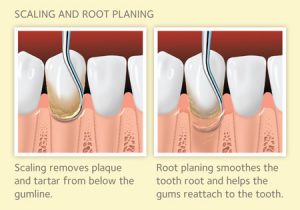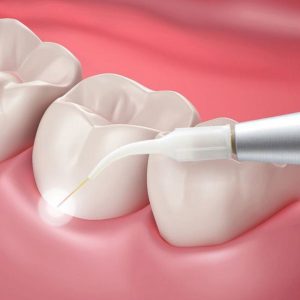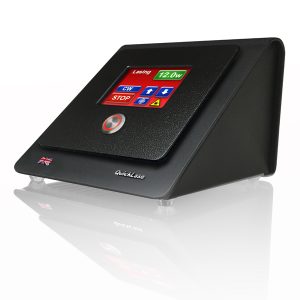Gum Disease (Periodontal Disease) Treatment – the procedure:
At Dental World Cornwall, we are carrying out Gum Disease Treatment painlessly under local anaesthesia. Before you attended your appointment, you already had a hygienist appointment and received oral hygiene instructions, such as using interdental brushes (TePe’s/Easypicks) and other tools. That is an absolute precondition for successful treatment of your Gum Disease!
Sometimes, we will dispense/prescribe antibiotics that must be taken during the treatment. The combination of oral antibiotics and the removal of the Biofilm has proven to be very effective in treating severe and acute periodontitis. The theory behind the combination of local plaque (Biofilm) removal) while the deep scaling is aimed at the teeth and gum surfaces, the antibiotics can, to a certain extent, reach the deeper tissue and eradicate the bacteria, which cannot be removed by deep scaling and laser treatment alone.
Read about the connection between Gum Disease and Heart Health:
Gum disease and heart health: how are they connected? – BHF

Soft tissue laser for the treatment of Gum Disease, Cosmetic Dentistry, minor oral surgery
Advanced Periodontal Treatment at Dental World Cornwall
We are offering an advanced treatment protocol for treating gum disease:
Combination of Laser and Deep Scaling.
We remove infected gum tissue with a gentle Laser combined with Deep Scaling and Root Planing. The aim is to remove the destructive biofilm that covers the surface of the diseased teeth. Once the so-called “Biofilm” has been removed – new gum tissue can grow and attach to the surface of the roots. The gum will feel healthier, and previously mobile (loose) teeth will “tighten up.”
Side effects:
Often, the gum is swollen due to gum inflammation. Plaque and calculus cause an acute inflammatory response, which manifests itself as swollen and bleeding gum (gingiva).
After the source of the inflammation (Plaque, Biofilm) is removed, the gingival usually heals very quickly, and the swelling of the gum disappears. In patients with severe gum disease, the roots of the teeth can become more exposed and sensitive. That is often temporary and can be treated.
Periodontal gum surgery: exposed root surfaces can also be surgically treated.
Here is an example of such surgery: Gum Surgery
 Our Dentists use the UK-manufactured Quicklase Soft Tissue Laser at Dental World Cornwall.
Our Dentists use the UK-manufactured Quicklase Soft Tissue Laser at Dental World Cornwall.
Additional Therapies
Low-Level Laser treatment to reduce bacteria and improve healing.
The treatment is also called “antimicrobial photodynamic therapy.” This combined treatment approach significantly reduces the number of destructive bacteria (e.g., Staphylococcus aureus).
Illustration of the HELBO Laser Treatment:
Application of the dye into the pocket and activation with HELBO Laser
Procedure:
The patient will be treated under local anaesthesia. The pockets, bleeding and tooth mobility are measured and recorded in the patient’s file. The pockets are then thoroughly mechanically cleaned using scalers and curettes. The photosensitizer (dye) is applied, and after the contact, it is rinsed out. The pocket probe (Helbo Laser) is inserted into the pocket and activated. The procedure can be repeated in severe cases within seven days to achieve the best results. Since its introduction in our practice, HELBO Photodynamic Therapy has shown excellent results in the Treatment of Periodontal Disease and Peri-implantitis.
Staphylococcus aureus is a bacteria responsible for infections around dental implants (Peri-implantitis). It is also present in cases of MRSA because of its affinity to titanium surfaces and resistance to many Antibiotics. Dental Implants manufactured from titanium are at a high risk of infections if the neighbouring teeth are infected with Staphylococcus aureus. Within minutes of the placement, a dental implant is colonized with Staphylococcus aureus bacteria from the surrounding teeth!
Therefore, the treatment of gum disease before dental implant therapy is essential. The Treatment of Staphylococcus-infected implants is difficult as local antibiotics don’t reach the areas. The use of systemic antibiotics is very questionable due to the fact of the ever-increasing global resistance to antibiotics. Mechanical cleaning of implant surfaces is difficult as the risk of damage to the implant surface is high. It also does not eradicate the bacteria. The concept of photodynamic therapy has been proven to be very successful in the treatment of peri-implantitis. We offer this treatment to our patients and patients with implants fitted elsewhere.
